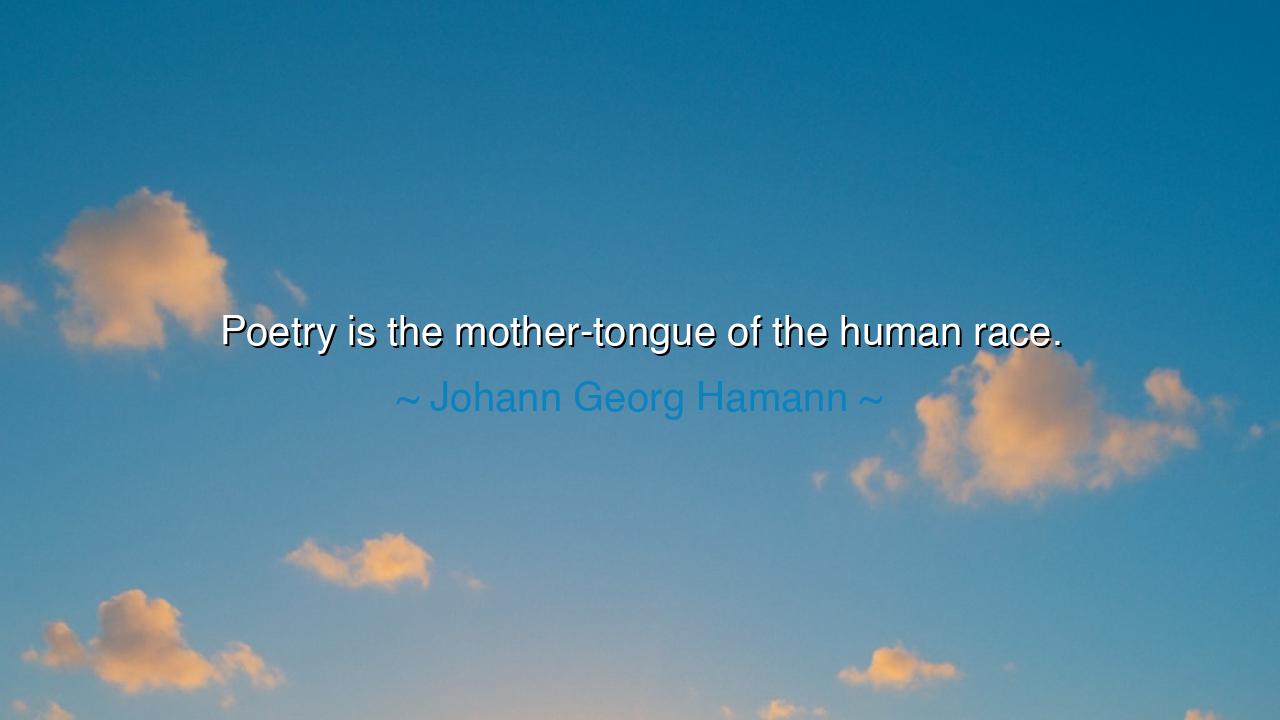
Poetry is the mother-tongue of the human race.






Hear the voice of Johann Georg Hamann, the German sage of paradox and fire, who proclaimed: “Poetry is the mother-tongue of the human race.” In this single sentence, he calls us back to our origins, before grammar, before science, before the cold machinery of reason. He declares that our first speech was not technical nor analytic—it was poetry. The cries of awe before the sky, the chants around the fire, the first myths told to children—these were not explanations, but songs. Poetry was not decoration; it was survival, memory, and meaning itself.
The mother-tongue Hamann speaks of is not a dialect of one tribe or nation, but the primal language of all mankind. Long before alphabets carved words into stone, the human heart sought to clothe its wonder in rhythm and image. When thunder roared, man did not speak of electrical discharge—he spoke of Zeus hurling lightning, of Thor’s hammer, of divine power. When love stirred his breast, he sang, he wept, he carved hearts upon the walls of caves. These were not data points, but poetry. Thus Hamann teaches that our first and truest language is the language of image, song, and story.
Consider the ancient epics. Homer’s Iliad and Odyssey were not “literature” in their time—they were the memory of the people, their history, their faith, their code of honor. The Vedas of India, the Psalms of Israel, the chants of the Polynesian navigators—all arose before history was written down. Through poetry, memory was preserved and passed from tongue to tongue, generation to generation. If writing is the ledger of civilization, poetry was its heartbeat long before the ledger existed.
Hamann’s insight stands also against the arrogance of cold rationalism. In the age of Enlightenment, when men sought to explain the world by reason alone, he reminded them that reason itself is a late invention. Beneath it lies something more primal, more human: the imagination that makes sense of mystery through symbol. To deny poetry is to deny our origin, to strip away the mother who first taught us how to speak. Rational speech explains; poetic speech reveals. One builds; the other inspires. Both are needed, but one came first, as mother before child.
History gives us examples of those who understood this. Consider the figure of Martin Luther King Jr. His speeches were arguments, yes, but they were clothed in poetry: “I have a dream,” “Let justice roll down like waters.” It was this mother-tongue that stirred nations, for while logic convinces, only poetry transforms. King’s words stood not as mere political reasoning, but as echoes of humanity’s oldest tongue: the rhythm, the vision, the flame that reaches the heart.
The lesson, then, is clear. Do not think of poetry as mere artifice, a pastime for the idle, or a luxury for scholars. Recognize it as the foundation of all human language, the mother-tongue from which all our speech has grown. When you speak with metaphor, when you sing, when you tell a story, you return to that original stream. To live fully is to remain connected to it, to let poetry guide even your prose, your work, your daily interactions.
Therefore, remember Hamann’s wisdom: “Poetry is the mother-tongue of the human race.” Guard this truth, and let it shape how you live and speak. Seek poetry in the world around you—in the rising of the sun, in the laughter of friends, in the silence of grief. For in doing so, you do not merely decorate your life; you return to the language of your ancestors, to the speech that first gave meaning to the world. And in that return, you rediscover what it means to be human.






HDpham hoang duong
Hamann’s quote evokes a powerful image of poetry being essential to human expression. But I wonder, if poetry is the mother-tongue, is it something that is innate, or is it a form we learn to appreciate over time? Can poetry shape our understanding of ourselves and the world in the way a mother-tongue shapes how we communicate, or does its meaning change with time and culture?
DVNguyen Duc Viet
The idea that poetry is our ‘mother-tongue’ suggests that it’s something innately familiar, almost primal. It makes me wonder, though, can everyone connect with poetry in the same way? Is there something in the act of reading or writing poetry that taps into a shared human experience, or does the personal connection to poetry vary depending on one’s background and individual experiences? How can poetry reach all people on a deep, fundamental level?
PPhanh:))
Hamann’s statement about poetry as the ‘mother-tongue of the human race’ makes me reflect on how much poetry connects us to our most basic emotions and instincts. But can poetry really be understood across different languages and cultures in the same way? If poetry is so universal, does it transcend specific linguistic structures, or does each culture’s version of poetry bring its own unique meaning to the table?
QNQuan Nguyen
I find Hamann’s comparison of poetry to the ‘mother-tongue’ intriguing, especially because it suggests that poetry is essential to the human experience. But does this mean poetry is universal, or is it a more cultural phenomenon? If poetry is the mother-tongue, does it imply that all humans are connected through it in some way, regardless of the language they speak? How do different cultures express the same universal human truths through poetry?
GDGold D.dragon
Hamann’s idea that poetry is the ‘mother-tongue of the human race’ is beautiful, but I wonder—what does that really mean in a practical sense? Is poetry something we innately understand, or is it something we learn through exposure and experience? Could it be that poetry expresses the deepest parts of human emotion, something that transcends language, or is it more about the way we construct meaning with words?